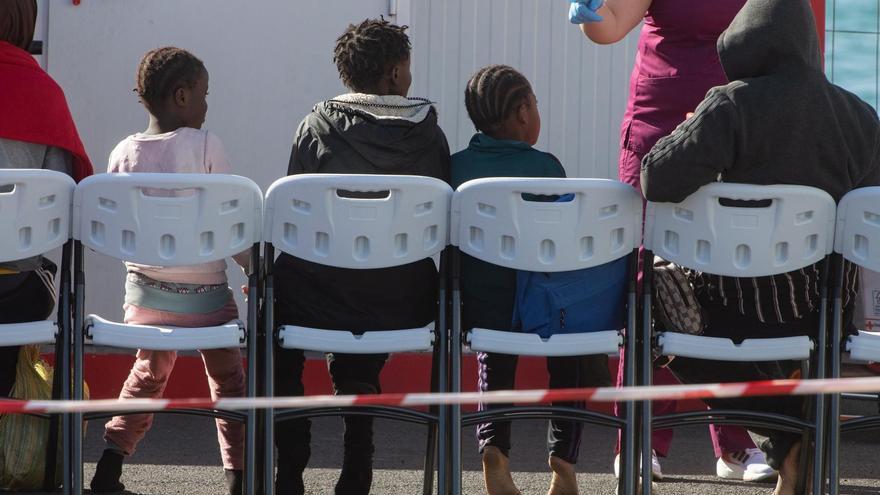
Court number 2 of San Bartolome de Tirajana (Gran Canaria) ordered the immediate release of a Senegalese juvenile who spent 57 days in the prison of The Palms II. The decision was made after confirming that he is not an adult following reports on the tests conducted by the Institute of Legal Medicine on two young individuals who from entered prison provided birth certificates from the outset indicating their ages as 15 and 17 years old, respectively. Forensic evidence confirmed Assame’s minority, who was handed over to the General Directorate of Child Protection of Government of the Canary Islands awaiting trial, while his partner Boubou will remain in preventive detention for being declared an adult.
“Having juveniles in adult prisons is nonsensical and affirms that overcrowding and lack of personnel prevent us from ensuring the rights of young boys and girls,” stated the Canary Islands president Fernando Clavijo, upon learning about the juvenile’s release.
However, Assame’s case is not the only one where, in Clavijo’s terms, the rights of juveniles are not upheld: in the penitentiary center of Tenerife, there are two other young individuals who have been in prison for four and six months. The first of them, whom his defense lawyer, Sara Rodríguez Trigo, refers to as K, was one of the survivors of the cayuco located in October 82 miles off the coast of Granadilla de Abona (Tenerife) where the lifeless body of a child of about 12 or 13 years old was found, while another 19 deaths had been thrown into the sea during a voyage that departed from Gambia with more than 240 people on board. The second of these individuals arrived in the first days of the migratory surge that began last summer.
Clavijo requests “immediate” solution to “absurdity” of having juvenile prisoners in jails
[–>
Both asserted on the dock that they were not adults. K presented his birth certificate dated in 2007 (16 years old), yet he was registered as an adult (20 years old) and was sent to jail because four witnesses claimed to have seen him distributing water in the cayuco, which according to the Prosecutor’s Office is “sufficient evidence of criminality” to accuse him as the presumed skipper of the boat. The case of the other juvenile is more complex, as he did not provide any documents and his family from Senegal has not been reached yet to send the certificates to confirm his age.
Nevertheless, the decision to incarcerate them as adults contradicts the criteria expressed both by the United Nations (UN) and the jurisprudence based on multiple Supreme Court rulings that prioritize the “presumption of minority” and the “best interests of the child” over any other consideration.
The experts forming the Committee on the Rights of the Child (CRC) of the UN advised Spain in 2020 that while the procedure to determine the age of the migrant is pending, “the person should be presumed to be a minor and treated as such,” which has not happened in the cases of incarcerated juveniles in Canarias.
Years before, in 2005, the Criminal Chamber of the Supreme Court (TS) issued a ruling specifying that in a “seemingly doubtful situation, we must conclude that against the assertive affirmation of an age”, which can have both “self-defensive” and “self-protective purposes”, the “certainty of the duly authenticated and protocolized birth certificate” must prevail, as is the case with the birth certificate that K provided at the time, although for the Prosecutor’s Office, as attorney Rodríguez Trigo states, “only the passport is valid,” a document that the vast majority of migrants arriving in the Canary Islands in cayucos do not possess.
Child’s best interests
[–>
Also, the TS, in a 2022 ruling, stated that the best interests of the child “require a particularized assessment of each case in light of the concurrent circumstances” and must “reconcile” both “diligence aimed at preventing fraud by criminal organizations” and “the danger that cohabiting with an adult poses for the minors, with the risk, on the other hand, of treating a minor as an adult and leaving the genuine minor unprotected”
Both President Clavijo and the Minister of Social Welfare, Candelaria Delgado, and Vice Minister Francisco Candil are pointing in the same direction to prevent minors from being incarcerated with adults: “more material and human resources with specifically trained teams” to promptly assess the age of the individuals arriving in the Archipelago.
An operation like the one that was set up in the south of Tenerife during November and December as a pilot experience, which inexplicably was not reactivated despite the fact that Canary Islands has received 11,704 migrants on its coasts since January 1, a figure that exceeds by 10,102 the number reached in the same period of 2023, when 1,602 people arrived in the archipelago. These individuals have arrived on 176 precarious boats, 139 more than the 37 that arrived in the first month and a half of 2023, according to the biweekly report published this Friday by the Ministry of the Interior.
There are 15 documents from the UN urging Spain to modify the procedure to determine the age
[–>
At present, the Canary Islands government has guardianship of over 5,600 minors and Vice Minister Candil believes that “1,400 are adults,” although the delay in the oseometric tests hinders certifying their age.
Regardless, there are up to 15 documents from the UN urging Spain to modify the current procedure of age determination, as “the commonly practiced X-ray has a margin of error of four years”. And in 2015, the Supreme Court ruled that “current techniques do not allow for establishing with total precision the age of an individual”.
Furthermore, the forensic report issued about K three months after his admission to Tenerife II (stating that he is over 18 and was challenged by his attorney) acknowledges that his details “do not offer an absolute degree of certainty, with a margin of error”.
















